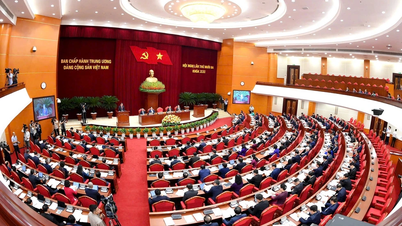Dr. Nguyen Thanh Hung, Head of Training Department, Hanoi University of Science and Technology, said that among the students who are slow to graduate each year, there are cases due to foreign language output requirements.
Regarding the reason why students are late in graduating due to foreign language standards, Mr. Hung said that it is not because the school's standards are too strict. "Human resources who want to work in the technical and technological fields in an increasingly international environment need to have a certain level of English ability. The delay in graduation can come from a number of reasons."
"First, some students from rural areas or from poor families have a poor initial foreign language foundation. Later, they are busy with their majors and due to conditions, they do not have much time to learn English. Second, foreign languages are difficult to accumulate quickly, they have to "take it slow and steady", while many students think they will only study when they need to for exams, and then the time to study until graduation is not enough. Third, maybe in the final years, students do internships or even work part-time, so they are busy and neglect it," Mr. Hung analyzed.
However, according to Mr. Hung, in reality, the number of students who are delayed in graduating because of foreign language problems mainly study the standard program (studying purely in Vietnamese). Students studying the advanced program almost do not have this problem, because they all have a foundation and study in English.

Dr. Le Anh Duc, Deputy Head of the Training Management Department of the National Economics University, said that on average, each year, the rate of students graduating late due to not meeting foreign language output standards in standard training programs taught in Vietnamese is about 20%. This figure in advanced training programs (100% taught in English) is about 5%. With special training programs (high-quality programs, POHE application-oriented programs taught 30-50% of subjects in English), the number of students graduating late compared to the standard plan is about 8%.
According to Mr. Duc, this problem comes from a number of reasons: “Some students are reluctant to study and often wait until their final year to take the English certificate exam, both to exchange their English course scores in the training program and to be recognized as meeting the foreign language output standards for graduation.
Besides, the English output standards of the National Economics University are applied according to international standards with 3 certificates that are considered prestigious/standard today: IELTS, TOEFL, TOEIC 4 skills, so students need time to adapt to these exams.
A representative of the University of Commerce said that every year, the school has cases of delayed graduation due to not meeting English output standards, including some students who are reluctant to study, others due to difficult conditions, have to work part-time to make ends meet, so they lack time to study foreign languages.
The reason, according to this person, is mainly due to students, the school does not set a standard level that is too high - level 3 according to the Vietnamese Foreign Language Proficiency Framework (equivalent to B1 according to the Common European Framework of Reference - CEFR or IELTS 5.0). This level is only equal to the foreign language proficiency level of the Vietnamese National Qualification Framework that sets the output standards for university graduates.
According to a representative of the University of Commerce, the number of students having problems with foreign languages is mainly those in rural and disadvantaged areas. “Students who are already weak in foreign languages, and study a heavier English program at university level, not only are they under pressure due to lack of time but also face financial problems. If they want to study more and improve their foreign languages, they need money. Meanwhile, paying tuition for the main program is already a burden for many students. Some students also face the disadvantage of having to work part-time to cover tuition and living expenses. Therefore, meeting foreign language output standards will be more difficult,” he said.
Normally, to ensure graduation, students usually complete the curriculum, then focus entirely on foreign language courses/credits. “So basically, they can still graduate but accept being late,” the representative added.
Dr. Thai Doan Thanh, Vice Principal of Ho Chi Minh City University of Industry and Trade, also shared that many students are currently quite negligent in completing the conditions to receive a diploma. Although the school has implemented very early, regularly reminded and urged, many students do not care about the conditions to receive a diploma as well as graduation.
Students often leave it until the last semester - "the last minute" - when this is the busy time for internships and graduation theses. Therefore, this makes them unable to meet the foreign language output standards.
Many types of foreign language output standards
At Ho Chi Minh City University of Technology, Associate Professor Bui Hoai Thang, Head of Training Department, said that currently, the school's standard training program (in Vietnamese) has a foreign language output standard equivalent to TOEIC 600. For the English/advanced teaching program, it is IELTS 6.0 (this is also the entrance standard).
At Ho Chi Minh City University of Industry, graduates must have a level 3 English certificate according to the Vietnamese Foreign Language Proficiency Framework, equivalent to B1 CEFR. The school also recognizes students who have an international English certificate to reduce pressure and students do not have to retake the course.
A representative of the University of Commerce said that the current English output standard for graduation consideration is level 3 according to the Vietnamese Foreign Language Proficiency Framework (equivalent to B1 according to the CEFR Framework or IELTS 5.0); for the language major, it is level 5 according to the Vietnamese Foreign Language Proficiency Framework (equivalent to C1 according to the CEFR Framework or IELTS 6.5).
However, in the future, to improve training quality, the school will tend to raise the English output standard upon graduation to IELTS 5.5 or higher.
Dr. Le Anh Duc, Deputy Head of the Training Management Department of the National Economics University, said that the school applies foreign language output standards for advanced training programs (100% taught in English) with a minimum of IELTS 6.5 and equivalent. Specialized training programs (high-quality programs, POHE application-oriented programs with 30-50% of subjects taught in English) have a minimum of IELTS 6.0 and equivalent. Standard training programs taught in Vietnamese have a minimum of IELTS 5.5 and equivalent.
Meanwhile, at the Banking University of Ho Chi Minh City, Principal Nguyen Duc Trung said that the school does not set a foreign language output standard because it has stipulated that students must have an English input standard of level 4 according to the Vietnamese Foreign Language Proficiency Framework - equivalent to B2 according to the CEFR Framework to study a major. Specifically, in the middle of the third year, when studying a major in depth, students already have a level 4 input standard and all majors are the same. As for the English Language major, the input standard is Chinese.
“The output standard regulation is outdated for us. We have removed this from 2022 because from the third year onwards, students of the school are required to have a level 4 English standard to study their major. On the other hand, the school's majors are all taught in English. Up to now, the number of students graduating on time (4 years) in the most recent year is 89.8%. Students who graduate late (up to 4.5 years) are mainly due to studying a double major, not related to the English output standard,” said Mr. Trung.

Thousands of students have their diplomas 'detained' due to English output standards

The Ministry of Education and Training will develop a project to make English the second language in schools.
Source: https://vietnamnet.vn/hang-loat-sinh-vien-vuong-chuan-dau-ra-tieng-anh-bi-lo-hen-tot-nghiep-vi-dau-2326261.html



![[Photo] Closing of the 13th Conference of the 13th Party Central Committee](https://vphoto.vietnam.vn/thumb/1200x675/vietnam/resource/IMAGE/2025/10/08/1759893763535_ndo_br_a3-bnd-2504-jpg.webp)































































































Comment (0)